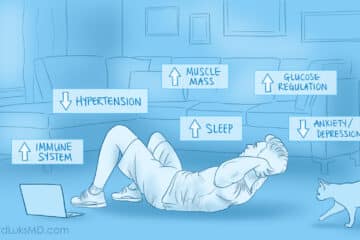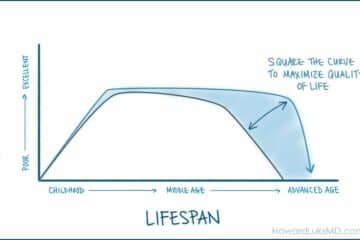
Why? Well, actually- because it leads to less anxiety, less depression, and better sleep. A poorly regulated circadian rhythm also leads to weight gain, impulsive behavior, slower cognition, and more.
Why? Because it resets your circadian rhythm?
What’s that? From the NIH: Circadian rhythms are physical, mental, and behavioral changes that follow a 24-hour cycle. These natural processes respond primarily to light and dark and affect most living things, including animals, plants, and microbes. Chronobiology is the study of circadian rhythms. One example of a light-related circadian rhythm is sleeping at night and being awake during the day.
What are biological clocks?
Biological clocks are organisms’ natural timing devices, regulating the cycle of circadian rhythms. They’re composed of specific molecules (proteins) that interact with cells throughout the body. Nearly every tissue and organ contain biological clocks. Researchers have identified similar genes in people, fruit flies, mice, plants, fungi, and several other organisms that make the clocks’ molecular components.
What is the master clock?
A master clock in the brain coordinates all the biological clocks in a living thing, keeping the clocks in sync. In vertebrate animals, including humans, the master clock is a group of about 20,000 nerve cells (neurons) that form a structure called the suprachiasmatic nucleus, or SCN. The SCN is in a part of the brain called the hypothalamus and receives direct input from the eyes.
OK… let’s simplify this. Why should we get 2-10 minutes of light in our face in the morning?
First, some caveats.
- Go outside… don’t peer through glass
- don’t wear sunglasses
- you do not need to look directly at the sun
- and it works on cloudy days too.
What happens? Why is this so important. Your circadian rhythm can upset your biological and master clocks… they control a number of hormones and proteins that will determine how you perform during the day– if you’re tired during the day– if you’re going to be impulsive, anxious, and most important– if you are going to sleep well that evening.
HOW?
When the light enters your eyes it goes through a few key structures and ends at the pineal glands and suprachiasmatic nucleus (SCM). That light signal slows down the nighttime hormones, raises your cortisol and other hormones so you wake up and get ready for the day. All your organs receive signals from these two regions in the brain. If you do not get light in the morning, you do not fully arouse your master/biological clocks. You’re in a grey zone.
The hormones that are triggered and get you ready to take on the day get all your systems ready.. without that you can feel blah.
Later that same day… these hormones start to diminish. They need to diminish from a high normal level (from early sun) to a much lower level to start the processes in motion that will enable you to sleep that night.
Starting 1-2 hours before bed… turn down the ambient light in your home. I would say don’t use your phones, etc… but for many, that’s an addiction they can’t break.
Now.. lower light starts to signal your melatonin and other nighttime hormones and proteins that are necessary for sleep.
Do you have questions regarding an Orthopedic injury or longevity?
Do you want to talk to an expert who can listen to you for 45-60 minutes and explain the options in detail?
Dr. Howard Luks offers remote guidance sessions to review your X-ray or MRI images and explain your options.
Dr. Luks has also received hundreds of requests for educational sessions on the topics discussed in his book, Longevity Simplified.
See.. simple – LOL !
Much like the info on longevity that I try to engage you on.. there are simple things that we can do to improve our lives. 2-5 minutes of light in the morning can dramatically impact your anxiety, depression, eating habits, impulsivity, and sleep.
Seems like an easy enough experiment.. right?
For more info: How Early-Morning Light Exposure Makes Mice Less Depressed












